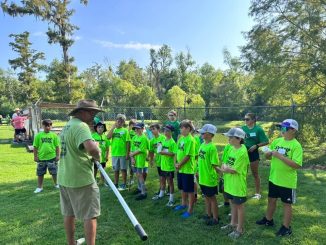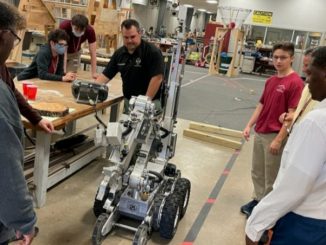
Enjoy outdoors with children but be mindful of safety
It’s great to spend time outside with your children, but you need to take a few precautions to ensure they stay safe.
During this season, when the weather starts to warm up and you’re spending more time outdoors, I think it’s a great time to get kids interested in gardening. Magic just seems to happen when you give a child a packet of seeds, a little spot of his or her own and a few demonstrations about what to do.While you’re enjoying the outdoors, however, keep in mind that spending time in the landscape with children, especially young ones, does require some attention on the parents’ part. Most of us don’t hesitate to childproof an indoor room, but we also need to remember it’s equally important to keep young ones safe by taking precautions in the yard.
Here are some tips on outdoor safety for children:
–Never leave a toddler or young child outdoors unattended.
–Fences or safety gates are a good way to help keep a wandering young one in bounds – although there is no substitute for a watchful eye. These are especially important on stairs or decks to prevent falls.
–Keep deck furniture away from all railings of raised decks or balconies, since children can climb onto the furniture and over the rails.
–Make sure that there is no access to the street or driveway from the children’s play area.
– Fence off ponds or other aquatic features, if necessary, and always be especially watchful of young children around ponds, pools, large puddles, buckets and large containers of any sort. Small children can drown in even small amounts of water.
– Never use a power lawn mower when children are in the yard. Mowers can throw objects considerable distances with great force. It’s also a good idea to check your neighbor’s yard to see if kids are playing outside there, since there are dangers from mowers even if the children aren’t near.
–Check your yard for plants with spiny leaves or thorns such as cactuses, roses, yucca, hollies or pyracantha. Point out any potential hazards to children, and fence off areas or plants that should be avoided. Remove dangerous plants, if necessary, especially if they are close to a play area. At any rate, do not plant spiny plants next to raised porches, decks or steps where children might fall into them.
–Although most insects in the garden are harmless, keep watch for potential problems and discuss with your children how to deal with insects they encounter and precautions they should take. In most cases, even insects that can sting, such as bees and wasps, generally will not be a problem if they are left alone. It is important, however, to control any fire ant hills in the area where children are likely to play or garden. Also, be familiar with the stinging caterpillars that occur in our state. (Contact your local LSU AgCenter Extension office for a fact sheet with pictures.)
–If your kids are going to do some gardening, it’s a good idea to purchase tools specially made for children. Those tools are properly sized for them to use, and it gives them a chance to more closely identify with gardening, since they have their own tools. It’s safer too!
–Be careful with sharp tools and discuss with your children which tools are safe for them to use and which are not. If you lay any of your tools down between uses, place forks, rakes and other pointed tools tines down. If kids are around, keep your eye on the tools or put them up promptly when they are no longer needed.
–Despite their sometimes-colorful labels, garden chemicals can be very dangerous if mishandled. If you do have garden pesticides, be sure to store them in locked cabinets in their original containers. This includes organic pesticides – some of which are quite toxic.
–Never use empty food or drink containers for storing pesticides, cleaning supplies or fertilizers!
–Do not leave pesticide containers out while using them. Put them up promptly in a safe location after you have mixed the material.
–Children should never be around while pesticides are being mixed or applied.
–Make sure poison ivy is not allowed to grow in your landscape. Watch for this vine with three-part leaves and immediately eliminate it should you find any. If needed, herbicides such as glyphosate and trichlopyr can be used in control.
–As they get old enough to understand, teach your children not to eat any plant unless an adult is supervising. Eating fruits and vegetables you’ve grown yourself is part of the joy of gardening, but many common ornamental plants can make you sick if you eat them, and some are very poisonous. A free list of common poisonous plants is available from your parish LSU AgCenter Extension office, or you can check out the many excellent poisonous plants sites on the Internet.
–Do not allow children to eat soil from the garden. Some soils may contain relatively high amounts of lead or other toxic substances and should not be consumed.
–If you use stakes to support plants, be sure the stakes are taller than your small children or toddlers, Short stakes can cause eye injuries to kids. You also need to be careful around stakes for the same reasons.
–Always wash hands after gardening and use antiseptics on cuts or scrapes.
–Store the gas tanks for propane grills so that children cannot reach the knobs.
If you simply take a little time to look at the world from your child’s point of view, you’ll get some ideas on what to do. With the right attitude and a little work, the yard can be a safe and happy place that’s ready for hours of family gardening fun in all the seasons.




Be the first to comment